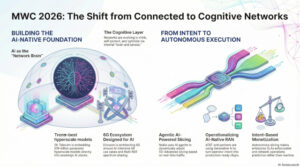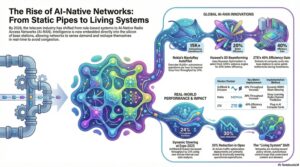Data, whether structured or unstructured, is now the fuel powering AI’s disruptive capabilities. AI’s effectiveness is fundamentally dependent on data, and it is impossible to separate the two. At a recent Digital Transformation World (DTW) event, Amol Phadke highlighted Telenor’s “AI First” strategy, where AI and data are central to their transformation efforts.
Amol emphasized that AI and data are at the heart of Telenor’s operations, not merely on the sidelines or as part of IT or network functions. This perspective underscores the essential truth that, over the past decade, data has become recognized as a critical asset. Previously, conventional AI/ML techniques were applied primarily to structured data. However, the alignment of AI and data in 2024, with the advent of Generative AI (GenAI), represents a significant advancement.

Image source: https://inform.tmforum.org/dtw/what-does-it-take-to-be-an-ai-first-telco-amol-phadke
The importance of data is well articulated in Eugina Jordan’s “GenAI for Networks” series. She begins by discussing the types of data networks can provide for training large language models (LLMs) to generate intelligence and subsequent actions. Eugina outlines three key considerations for placing data at the center of AI transformation: security, quality, and privacy. These considerations are vital not just for telecom operators but for any enterprise use case.
In my article published by ACL Digital, I discussed current GenAI use cases by telecom operators, focusing on customer experience enhancement and internal productivity. These use cases highlight the significant role of data analysis. For telecom operators to realize the full potential of GenAI implementation—such as cost reduction, efficient networks, and monetization—effective data management is crucial. These are recent findings, and we can expect to see more developments in this area.
The crucial question is: what happens if AI and data are not central to any AI implementation? Here are some insights:
Amol pointed out the first pitfall: without a centralized data strategy, data will be fragmented across various teams within an organization, leading to diminished data value. This can result in inaccurate data models due to inconsistent data sources, causing several issues:
- Poor Decision Making: Without high-quality data, AI models will produce inaccurate or unreliable results, leading to poor decision-making.
- Decreased Performance: The AI’s ability to optimize network performance, predict issues, and enhance customer experience will be compromised.
Additionally, there are significant risks related to security and privacy:
- Data Breaches: Inadequate data security measures can lead to breaches, exposing sensitive information and damaging the operator’s reputation.
- Regulatory Non-Compliance: Failing to adhere to privacy regulations can result in legal penalties and a loss of customer trust.
Furthermore, there are limitations in scalability:
- Difficulty Scaling AI Solutions: Without a solid data strategy, scaling AI solutions across different network segments and geographies becomes challenging.
- Inconsistent Results: Variability in data quality and management can lead to inconsistent AI performance across different areas of the network.
In conclusion, the integration of AI and data as a core strategy is essential for successful AI implementation. What are your thoughts on this? Please feel free to comment and share your views.






Be First to Comment